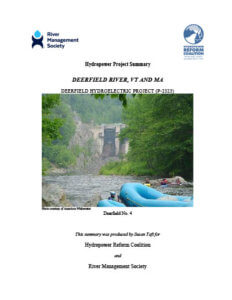D.C. Court Denies Waiver of Clean Water Act for Tuolumne River Hydro Projects; Ruling Vindicates CSPA and Allies
On June 17, 2022, the U.S. Court of Appeals, D.C. Circuit issued a ruling denying waiver of Section 401 of the Clean Water Act in the licensing of two hydropower projects on the Tuolumne River. Turlock Irrigation District and Modesto Irrigation District (Districts) had petitioned the Court to waive “water quality certification” for the relicensing of their huge Don Pedro Hydroelectric Project and for the original licensing of their smaller La Grange Hydroelectric Project, two miles downstream of Don Pedro Dam.
The ruling means that the California State Water Resources Control Board (State Water Board) maintains its authority to issue mandatory conditions for the two projects, including flow requirements, which must be included by the Federal Energy Regulatory Commission (FERC) in new licenses for the projects. The State Water Board has also said that it may rely in part on these conditions in requiring flows into the lower San Joaquin River under the Bay-Delta Water Quality Control Plan.
The Districts had petitioned FERC on October 2, 2020 to find that the State Water Board had waived certification. As previously reported, CSPA and allied conservation groups vigorously opposed the Districts’ petition. FERC denied the Districts’ petition the day before President Biden took office. The Districts sued FERC on June 2, 2021 when FERC denied the Districts’ appeal on “rehearing.” As also previously reported, CSPA, American Whitewater, Friends of the River, the Sierra Club and its Mother Lode Chapter, and Tuolumne River Trust were granted intervenor status in the Districts’ case before the D.C. Circuit.
The Districts argued before FERC and before the D.C. Circuit that since the State Water Board had twice responded to the Districts’ applications with “denials without prejudice,” the State Water Board had unlawfully “failed to act” on the applications in one year, as required by Section 401. FERC responded that the State Water Board had “acted” in each case by denying the application. A joint brief by Water Power Law Group, Western Environmental Law Center, and the Morrison Foerster law firm on behalf of the conservation group intervenors supported FERC’s denial of waiver.
At oral argument in April 2022, the Districts’ attorneys emphasized that a state agency could hypothetically delay certification, and thus FERC licensing, by a hundred years. The Court, in its ruling, responded in part with a citation to recent case from North Carolina (North Carolina DEQ v F.E.R.C., — F.4th —, 2021 WL 2763265 (4th Cir. July 2, 2021)), which called out the potential for applicant gamesmanship to avoid certification (see previous CSPA discussion of the North Carolina case). The Court also highlighted the fact that the Districts had not even initiated environmental review under the California Environmental Quality Act (CEQA) to support the application for certification, which until summer 2020 had to be completed before the State Water Board could grant certification. And the Court declined to take up the Districts’ secondary arguments.
The June 17 ruling in this case is not certain to be the last word. The Districts can ask that the full D.C. Circuit Court hear the case if enough of its judges believe the ruling by the three-judge panel is deficient. The Districts can also petition the U.S. Supreme Court to hear the case.
Also, in separate actions before the State Water Board and in state court in Tuolumne County, the Districts and the City of San Francisco are contesting many of the mandatory conditions that the State Water Board included in its water quality certification for the projects in January 2021. The State Water Board has not yet issued a final response to “petitions for reconsideration” of the certification; that response may trigger further opportunity for new litigation or for joining existing litigation. CSPA is in the thick of the dispute before the State Water Board, as reported here in January 2022.
Nonetheless, the victory of the conservation groups and the states in the D.C. Circuit’s June 17, 2022 ruling is substantial. It restores process discipline to water quality certifications and efforts to waive them. The present ruling against waiver comes from the same Court of Appeals that issued the ruling in Hoopa Valley Tribe v FERC, 913 F.3d 1099 (D.C. Cir. 2019); Hoopa Valley Tribe v. FERC was the case that has given rise to numerous petitions for waiver, and the Districts relied heavily on it in their arguments. The fact that the Court that issued Hoopa Valley Tribe v FERC now places limits on findings of waiver adds weight to the present ruling and its importance.


